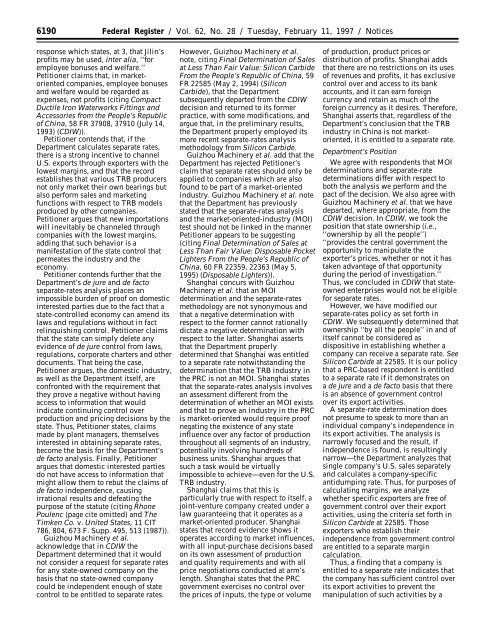federal register - U.S. Government Printing Office
federal register - U.S. Government Printing Office
federal register - U.S. Government Printing Office
You also want an ePaper? Increase the reach of your titles
YUMPU automatically turns print PDFs into web optimized ePapers that Google loves.
6190 Federal Register / Vol. 62, No. 28 / Tuesday, February 11, 1997 / Noticesresponse which states, at 3, that Jilin’sprofits may be used, inter alia, ‘‘foremployee bonuses and welfare.’’Petitioner claims that, in marketorientedcompanies, employee bonusesand welfare would be regarded asexpenses, not profits (citing CompactDuctile Iron Waterworks Fittings andAccessories from the People’s Republicof China, 58 FR 37908, 37910 (July 14,1993) (CDIW)).Petitioner contends that, if theDepartment calculates separate rates,there is a strong incentive to channelU.S. exports through exporters with thelowest margins, and that the recordestablishes that various TRB producersnot only market their own bearings butalso perform sales and marketingfunctions with respect to TRB modelsproduced by other companies.Petitioner argues that new importationswill inevitably be channeled throughcompanies with the lowest margins,adding that such behavior is amanifestation of the state control thatpermeates the industry and theeconomy.Petitioner contends further that theDepartment’s de jure and de factoseparate-rates analysis places animpossible burden of proof on domesticinterested parties due to the fact that astate-controlled economy can amend itslaws and regulations without in factrelinquishing control. Petitioner claimsthat the state can simply delete anyevidence of de jure control from laws,regulations, corporate charters and otherdocuments. That being the case,Petitioner argues, the domestic industry,as well as the Department itself, areconfronted with the requirement thatthey prove a negative without havingaccess to information that wouldindicate continuing control overproduction and pricing decisions by thestate. Thus, Petitioner states, claimsmade by plant managers, themselvesinterested in obtaining separate rates,become the basis for the Department’sde facto analysis. Finally, Petitionerargues that domestic interested partiesdo not have access to information thatmight allow them to rebut the claims ofde facto independence, causingirrational results and defeating thepurpose of the statute (citing RhonePoulenc (page cite omitted) and TheTimken Co. v. United States, 11 CIT786, 804, 673 F. Supp. 495, 513 (1987)).Guizhou Machinery et al.acknowledge that in CDIW theDepartment determined that it wouldnot consider a request for separate ratesfor any state-owned company on thebasis that no state-owned companycould be independent enough of statecontrol to be entitled to separate rates.However, Guizhou Machinery et al.note, citing Final Determination of Salesat Less Than Fair Value: Silicon CarbideFrom the People’s Republic of China, 59FR 22585 (May 2, 1994) (SiliconCarbide), that the Departmentsubsequently departed from the CDIWdecision and returned to its formerpractice, with some modifications, andargue that, in the preliminary results,the Department properly employed itsmore recent separate-rates analysismethodology from Silicon Carbide.Guizhou Machinery et al. add that theDepartment has rejected Petitioner’sclaim that separate rates should only beapplied to companies which are alsofound to be part of a market-orientedindustry. Guizhou Machinery et al. notethat the Department has previouslystated that the separate-rates analysisand the market-oriented-industry (MOI)test should not be linked in the mannerPetitioner appears to be suggesting(citing Final Determination of Sales atLess Than Fair Value: Disposable PocketLighters From the People’s Republic ofChina, 60 FR 22359, 22363 (May 5,1995) (Disposable Lighters)).Shanghai concurs with GuizhouMachinery et al. that an MOIdetermination and the separate-ratesmethodology are not synonymous andthat a negative determination withrespect to the former cannot rationallydictate a negative determination withrespect to the latter. Shanghai assertsthat the Department properlydetermined that Shanghai was entitledto a separate rate notwithstanding thedetermination that the TRB industry inthe PRC is not an MOI. Shanghai statesthat the separate-rates analysis involvesan assessment different from thedetermination of whether an MOI existsand that to prove an industry in the PRCis market-oriented would require proofnegating the existence of any stateinfluence over any factor of productionthroughout all segments of an industry,potentially involving hundreds ofbusiness units. Shanghai argues thatsuch a task would be virtuallyimpossible to achieve—even for the U.S.TRB industry.Shanghai claims that this isparticularly true with respect to itself, ajoint-venture company created under alaw guaranteeing that it operates as amarket-oriented producer. Shanghaistates that record evidence shows itoperates according to market influences,with all input-purchase decisions basedon its own assessment of productionand quality requirements and with allprice negotiations conducted at arm’slength. Shanghai states that the PRCgovernment exercises no control overthe prices of inputs, the type or volumeof production, product prices ordistribution of profits. Shanghai addsthat there are no restrictions on its usesof revenues and profits, it has exclusivecontrol over and access to its bankaccounts, and it can earn foreigncurrency and retain as much of theforeign currency as it desires. Therefore,Shanghai asserts that, regardless of theDepartment’s conclusion that the TRBindustry in China is not marketoriented,it is entitled to a separate rate.Department’s PositionWe agree with respondents that MOIdeterminations and separate-ratedeterminations differ with respect toboth the analysis we perform and thepact of the decision. We also agree withGuizhou Machinery et al. that we havedeparted, where appropriate, from theCDIW decision. In CDIW, we took theposition that state ownership (i.e.,‘‘ownership by all the people’’)‘‘provides the central government theopportunity to manipulate theexporter’s prices, whether or not it hastaken advantage of that opportunityduring the period of investigation.’’Thus, we concluded in CDIW that stateownedenterprises would not be eligiblefor separate rates.However, we have modified ourseparate-rates policy as set forth inCDIW. We subsequently determined thatownership ‘‘by all the people’’ in and ofitself cannot be considered asdispositive in establishing whether acompany can receive a separate rate. SeeSilicon Carbide at 22585. It is our policythat a PRC-based respondent is entitledto a separate rate if it demonstrates ona de jure and a de facto basis that thereis an absence of government controlover its export activities.A separate-rate determination doesnot presume to speak to more than anindividual company’s independence inits export activities. The analysis isnarrowly focused and the result, ifindependence is found, is resultinglynarrow—the Department analyzes thatsingle company’s U.S. sales separatelyand calculates a company-specificantidumping rate. Thus, for purposes ofcalculating margins, we analyzewhether specific exporters are free ofgovernment control over their exportactivities, using the criteria set forth inSilicon Carbide at 22585. Thoseexporters who establish theirindependence from government controlare entitled to a separate margincalculation.Thus, a finding that a company isentitled to a separate rate indicates thatthe company has sufficient control overits export activities to prevent themanipulation of such activities by a


